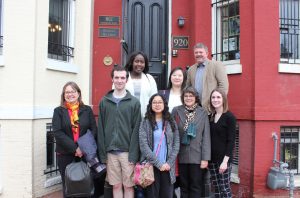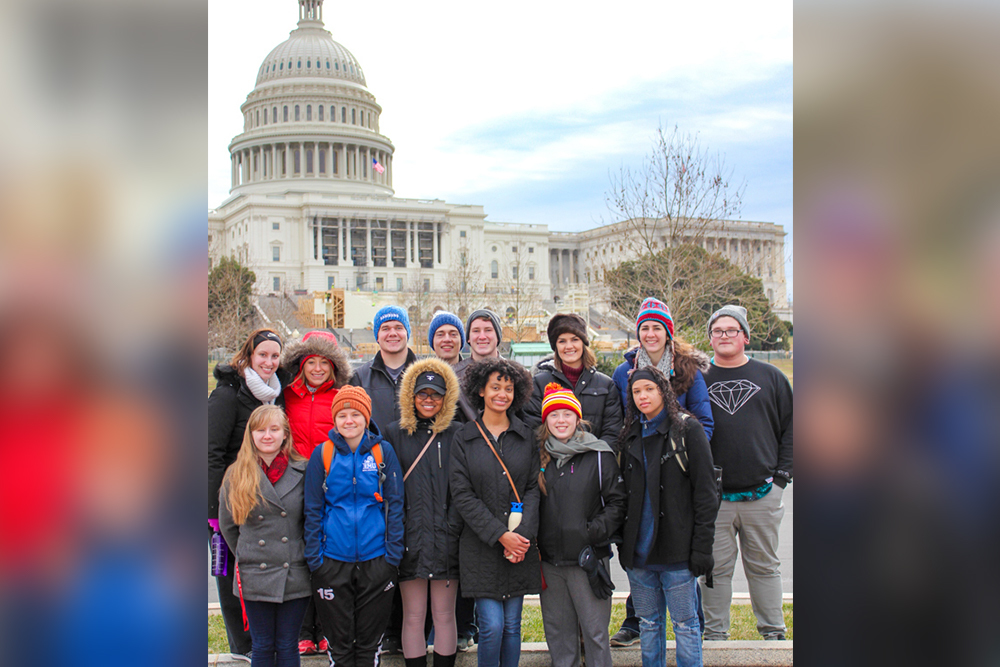A spring semester visit by Eastern Mennonite University students, history professors Mark Metzler Sawin, Mary Sprunger and Ji Eun Kim, and career services director Kimberly Phillips highlighted internship opportunities in policy and advocacy through the Washington Community Scholars’ Center (WCSC).
Through its strategic location in Washington D.C. and over 40 years of relationship-building with local organizations, WCSC is well-situated to provide impactful learning and internship experiences for all students, including those in EMU’s new political studies and global studies majors. Political studies students will have a semester at WCSC built into their program.
“WCSC has long-term connections and a history of successful placements with many area organizations working in public policy, advocacy, and international aid, among other fields,” said Director Kimberly Schmidt. “We are one of the few liberal arts universities with dedicated buildings and a local staff, which shows a real commitment to offering this kind of resume-building and urban cultural experience to students in all academic programs.”
During the visit, students majoring in history, peacebuilding and development, and global studies learned how their studies might apply to different types of positions and professions.
Informing politicians

The day began at the Mennonite Central Committee (MCC) Washington Office. After a tour, the group settled in for a discussion about MCC’s initiatives. MCC staff described how their office brings policy points from the organization’s worldwide peacebuilding and humanitarian projects back to Washington to inform politicians at the national level and advocate for justice issues.
“MCC’s D.C. office provides students [with the opportunity] to learn the nuts-and-bolts of advocacy work from within a pragmatic but also deeply Anabaptist setting,” said history professor Mark Metzler Sawin.
Members of the Capital Area Anabaptist Network, a local group that includes several EMU and WCSC program alums, joined the conversation for lunch. Pastors discussed how they have worked to reconcile and bridge the divide between the political overlay of DC and local populations that remain underserved and underrepresented.
Connecting equity issues to international challenges

Discussion of this local landscape offered context for the group’s next stop at Organizing Neighborhood Equity (ONE) DC, which engages in community organizing for equity and local housing rights. Here they joined current WCSC students for a special seminar with the organization’s leaders and with intern Kamran Mamedovi, a second-year graduate student at EMU’s Center for Justice and Peacebuilding. Mamedovi and another fellow graduate student are completing a required semester-long practicum while living in community with WCSC students.
Mamedovi described why he chose ONE DC for his practicum and his initial goal of learning frameworks from the Black struggle for equality in the US that he could apply to situations of ethnic inequality in his home country of Georgia. Along with ONE DC staff, he discussed the organization’s theory of change, which focuses on structural changes that go beyond service and advocacy alone. While Mamedovi noted that the answers to his questions are far more difficult and complex than he had imagined, he holds hope. “The biggest hope [for structural change] is if you can create an environment where everyone feels ownership and trust–where you feel it’s yours.”
The politics of climate change
The last stop before heading to the WCSC Nelson Good House for dinner was with Climate Nexus, a communications non-profit focusing on climate change. The group met with Senior Research Associate Nathan Kauffman ‘10, who participated in the WCSC program during his junior year.
“Nathan’s work vividly illustrates where strong research and writing skills can take you,” Sawin said. “Climate Nexus is an excellent internship option for people interested in environmental policy, but also those interested in honing their persuasive skills.”
Interns contribute to social, political landscape
The visit helped students and professors alike to see the variety of organizations and methods of engaging in policy work that students can explore. “These internships help students gain professional experience and distinguish themselves to potential employers,” Schmidt said.
“WCSC offers more than a typical internship program,” said Director of Career Services Kimberly Phillips. “Students are given the opportunity to contribute in meaningful ways and change the social and political landscapes around them.”
